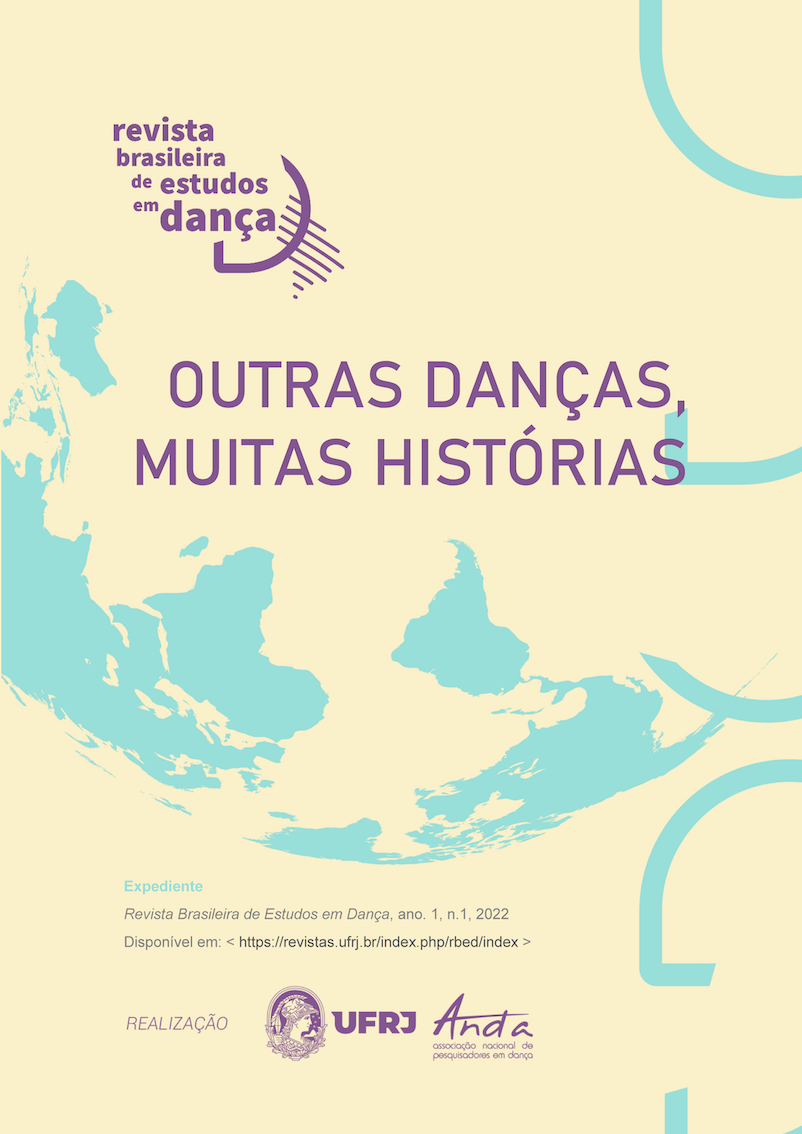La Danse Théâtrale en Angola:
46 Ans Sur un Terrain Instable Entre un Regard Flou Sur la Tradition et Un Discours Rétrograde Sur la Modernité
DOI :
https://doi.org/10.58786/rbed.2022.v1.n1.52839Mots-clés :
Dança, Angola, Ensino artísticoRésumé
Cet article propose une visite guidée à travers un terrain culturel instable, fortement marqué par un regard politique flousur la tradition lequel, à partir d'un certain moment, essaye dechangeren utilisantun discours qui reste rétrograde sur la modernité. Les contextes de la créationet du travail développé par l’École de Danse et par la Compagnie de Danse Contemporaine de l’Angola sont discutés.
Téléchargements
Références
ANÓNIMO, Estatutos da Academia de Bailado de Luanda. Luanda:1970
ANÓNIMO, Grupo Gulbenkian de Bailado (Programa). Lisboa: Neogravura Lda, 1971.
ANÓNIMO, Diário da República Nº 109 – I Série de 10.05.77. Luanda: Imprensa
Nacional,1977.
ANÓNIMO, Diário da República Nº 258 – I Série de 31.10.80. Luanda: Imprensa Nacional,1980.
ANÓNIMO, Diário da República Nº26 – I Série de 25.06.88. Luanda: Imprensa Nacional, 1988.
ANÓNIMO, Diário da República Nº 48 – I Série de 10.12.1993. Luanda: Imprensa Nacional, 1993.
ANÓNIMO, Diário da República Nº 23 – I Série de 09.06.00. Luanda: Imprensa Nacional, 2000.
ANÓNIMO, Simpósio sobre Cultura Nacional – Documentos, INALD. Luanda: Secretaria de Estado da Cultura, 1984
COMPANHIA de Dança Contemporânea. A Companhia de Dança Contemporânea Apresenta-se, INFAC. Luanda: LitoCor, Lda / Lito-Tipo, Lda, 1996.
GUERRA-MARQUES, A. C. e GUMBE, J. Proposta do Documento Regulador do
Ensino Artístico em Angola. Luanda: Instituto Nacional de Formação Artística e Cultural, 1998.
GUERRA-MARQUES, A. C. e TAVARES R. A Companhia de Dança Contemporânea de Angola. Lisboa: Mukixe Produções Audiovisuais, 2003.
GUERRA-MARQUES, A.C. Dança em Angola. In Dicionário Temático da Lusofonia. Porto: Texto Editores, 2005, p. 207-208.
GUERRA-MARQUES, A.C. Para uma História da Dança em Angola: Entre a Escola e a Companhia – Um percurso Pedagógico. Lisboa: Edições Mukixe, 2008.
GUERRA-MARQUES, A.C. Entre a Arte e a Educação: Manifestações Culturais na Sociedade Tradicional cokwe. In A. C. Guerra-Marques (Org), Memória viva da Cultura do Leste de Angola. Luanda: Ministério da Cultura, 2012, p. 129-155.
GUERRA-MARQUES, A.C. Máscaras Cokwe: A Linguagem Coreográfica de Mwana Phwo e Cihongo. Lisboa: Guerra & Paz e Kilombelombe, 2017.
INSTITUTO Nacional de Formação Artística e Cultural. Ciclo de Conferências sobre Formação em Dança. Luanda: 1990.
KAJIBANGA, C. M. Coreografia Rural: Uma contribuição para o estudo sociocultural de Benguela. Benguela: KAT Editora, 2009.
SUNGO, J. C. Reflexões sobre a dança angolana dos Zindunga do grupo étnico
Bakongo em tempo de Covid-19. In Revista Eletrónica KULONGESA, 3(E-1), 53-57, 2021. Disponível em: https://revistas.ipls.ao/index.php/kulongesates/article/view/240
MATEUS, D. C. A luta pela independência – A formação das elites fundadoras da FRELIMO, MPLA e PAIGC. Lisboa: Editorial Inquérito, 1999.
Téléchargements
Publiée
Versions
- 2024-05-10 (5)
- 2023-12-01 (4)
- 2023-11-30 (3)
- 2023-11-30 (2)
- 2022-07-15 (1)
Comment citer
Numéro
Rubrique
Licence
Les auteurs qui publient dans la Revista Brasileira de Estudos em Dança sont responsables du contenu des articles signés et en conservent les droits d'auteur. Ils accordent au journal le droit de première publication avec le travail simultanément sous Creative Commons Atribuição-Não Comercial 4.0 License (Open Archives Initiative - OAI). Cette ressource, utilisée pour les revues en libre accès, permet de partager l'œuvre à des fins non commerciales avec mention de la paternité. Si le texte est publié ultérieurement dans une autre revue, l'auteur doit indiquer qu'il a été publié à l'origine comme article dans la Revista Brasileira de Estudos em Dança. Ainsi, même si la revue est propriétaire de la première publication, les auteurs ont le droit de publier leurs œuvres dans des dépôts institutionnels ou sur leurs pages web personnelles, même si le processus éditorial n'est pas terminé.
La revue se réserve le droit d'apporter des modifications normatives, orthographiques et grammaticales afin de maintenir le standard linguistique, en respectant toutefois le style de l'auteur.

